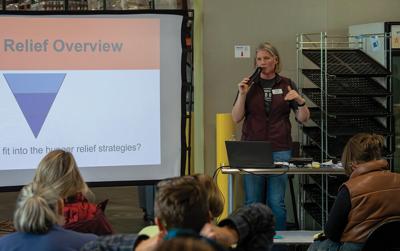By Nathan Wilson
Columbia Gorge News
THE GORGE — Members of local nonprofits, health organizations, counties and other entities assembled last Thursday to pool resources and rapidly develop a mutual aid network, expecting need to surge as people receive their November benefits from the Supplemental Nutrition Assistance Program (SNAP) later than expected.
Nearly 1.7 million people in Oregon and Washington depend on SNAP, which is administered by the United States Department of Agriculture (USDA), to afford groceries. Funding lapsed on Nov. 1 because of the ongoing government shutdown, and while contingency dollars do exist, the Trump administration and Agriculture Secretary Brooke Rollins have argued those pots aren’t “legally available.”
Two judges disagreed with that interpretation hours prior to the cutoff, and the administration announced it will partially fund SNAP just before press deadline on Monday. Doling out roughly $8 billion worth of monthly benefits across the country typically takes weeks, however, and it’s unclear both how much beneficiaries will receive and how quickly, so the Columbia Gorge Food Security Coalition approached their meeting with urgency.
“This is nothing short of a disaster,” said Breen Goodwin, executive director of the Columbia Gorge Food Bank. “For every meal we are able to provide to the food bank and food pantry system, SNAP is able to provide nine. SNAP is one of the most successful social service programs in the country that we’ve ever had.”
The coalition serves Hood River, Wasco, Sherman, Klickitat and Skamania counties, and depending on the area, between 10-25% of households receive SNAP benefits. Over the past decade, food insecurity has worsened in the Mid-Columbia. Out of 1,349 households that responded to a survey from the coalition (accessible at beav.es/GorgeFoodSurvey), 42% reported they either often or sometimes ran out of food in the past year — which is double the figure from 2015.
Available resources
“If we only use the food system that we have in place, we will not be moving fast enough,” said Goodwin. “What does it look like to develop mutual aid options that folks can start acting on and actually supporting their neighbors?”
Goodwin emphasized that food banks and pantries, which are intended to be the last line of defense in hunger relief efforts, cannot replace SNAP. Even though the governors of Oregon and Washington have allocated millions to bolster their respective systems, with Oregon Gov. Tina Kotek also declaring a temporary emergency, pantries simply don’t have the capacity to respond at scale.
For instance, FISH Board Chair Marianne Durkan reported that the Hood River site saw a record number of visitors a day prior to the meeting. It’s not a food issue, it’s a resource issue, Goodwin said.
Beyond getting food to SNAP recipients, the group brainstormed ways to lessen their financial burden, hoping they could spend the saved money at grocery stores instead. Some suggestions included transit fee waivers, support for paying utility bills and developing a gift card system to provide direct monetary assistance.
As for programs already in place, folks can receive $40 from Gorge Grown in SNAP Match and Double Up Food Bucks at the Hood River Farmers Market without any SNAP dollars. Pacific Power customers can apply for a low-income discount, as can Northwest Natural customers. The Mid-Columbia Community Action Council and Washington Gorge Action Programs also offer utility assistance.
Through its health-related social needs (HRSN) program, coordinated care organizations like PacificSource can cover up to six months of housing, utilities and groceries for eligible people on Medicaid, particularly those with a high-risk medical condition who are going through a transition like houselessness. Washington has HRSN services, too.
The coalition is actively building out a list of available resources for SNAP recipients, accessible at docs.google.com/document/d/1q29cNWjmOPRHqEop72Dn4l1P2gXGm0VtQcJiCvE2clU/edit?tab=t.0 or on Columbia Gorge Food Bank’s Facebook page. Visit oregonfoodfinder.org to locate places that provide free food. An even broader list of resources is available at www.hoodriverprevents.com/resource-guide.
“We’re not going to solve all of the problems today,” said Goodwin. “But, in this space, to see this group of people here today trying to learn, trying to engage and trying to figure out how to move forward gives me hope.”
For those not struggling with food insecurity, Goodwin encouraged folks to look out for their neighbors, pay it forward at restaurants and invest in the food pantry system, either by donating needed supplies, giving your time or with direct financial support.
Prior cuts impact response
The Trump administration’s handling of SNAP payments is just the latest in a string of policy decisions that have put ever more strain on hunger mitigation work.
The Columbia Gorge Food Bank and its pantry partners had more than 77,000 visits last year, and the Oregon Food Bank network saw a record 2.5 million visits statewide — a 31% jump compared to the year prior — but Goodwin has less food flowing through her warehouse. In March, USDA axed $500 million from the Emergency Food Assistance Program, which buys food from domestic farmers and sends it to distributors nationwide, leading to an 18% reduction in her annual supply, as previously reported by Columbia Gorge News.
Trump’s Big, Beautiful Bill also eliminated SNAP-Ed, a program designed to provide nutrition education, promote physical activity and help low-income people lead healthier lives. According to Lauren Kraemer, an associate professor of practice at Oregon State University (OSU), the institution had lay off 80 employees who helped create community gardens at farmworker housing sites, teach cooking classes and conduct outreach in schools, among other initiatives.






















Commented
Sorry, there are no recent results for popular commented articles.